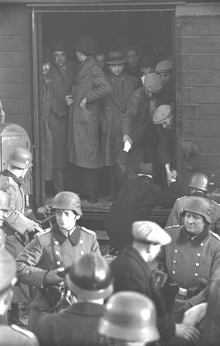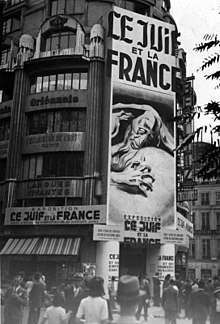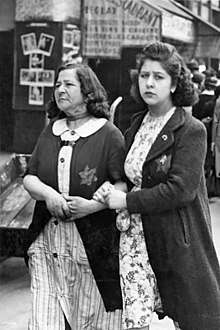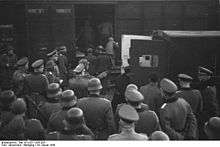The Holocaust in France
The Holocaust in France was the persecution, deportation, and annihilation of Jews and Roma between 1940 and 1944 in occupied France, metropolitan Vichy France, and in Vichy-controlled French North Africa, during the World War II. The persecution began in 1940, and culminated in deportations of Jews from France to Nazi concentration camps in Nazi Germany and Nazi-occupied Poland. The deportation started in 1942 and lasted until July 1944. Of the 340,000 Jews living in metropolitan/continental France in 1940, more than 75,000 were deported to death camps, where about 72,500 were killed. The government of Vichy France and the French police participated in the roundup of Jews.[1] Although most deported Jews died, the survival rate of the Jewish population in France was up to 75%, which is one of the highest survival rates in Europe.[2][3]

Background
In the summer of 1940, there were around 700,000 Jews living in French-ruled territory, of which 400,000 lived in French Algeria, then an integral part of France, and in the two French protectorates of Tunisia and Morocco. Metropolitan France had a population of about 150,000 Jewish nationals during the Interwar period.[4] In addition, France hosted a large population of foreign Jews who had fled persecutions in Germany. By 1939, the Jewish population had increased to 330,000 due to the refusal of the United States and the United Kingdom to accept any more Jewish refugees following the Évian Conference. After the occupation of Belgium and the Netherlands in 1940, France hosted a new wave of Jewish immigrants and Jewish population peaked at 340,000 individuals.[4]
At the declaration of World War II, French Jews were mobilized into the French military like their compatriots, and as in 1914, a significant number of foreign Jews enlisted in regiments of foreign volunteers.[5] Jewish refugees from Germany were interned as enemy aliens. In general, the Jewish population of France was confident in the ability of France to defend them against the occupiers, but some, particularly from Alsace and the Moselle regions, fled westwards into the unoccupied zone from July 1940.[6]
The armistice of 22 June 1940, signed between the Third Reich and the government of Marshal Philippe Pétain, did not contain any overtly anti-Jewish clauses, but it did indicate that the Germans intended the racial order existent in Germany since 1935 to spread to Metropolitan France and its overseas territories:
- Article 3 warned that in the regions of France occupied directly by the Germans, the French administration must "by all means facilitate the regulations" relating to the exercise of the rights of the Reich;
- Articles 16 and 19 warned that the French government had to proceed to repatriate refugees from the occupied territory and that "The French government is required to deliver on demand all German nationals designated by the Reich and who are in France, in French possessions, colonies, protectorates and territories under mandate."
Under the terms of the armistice, only part of Metropolitan France was occupied by Germany. From the city of Vichy, the government of Marshal Pétain governed a new French State (l'État français) in southern France and the departments of French Algeria, together with France's overseas territories such as Morocco, Tunisia, Indochina, the Levant, etc. The Vichy regime saw its empire as an integral part of non-occupied France, and its anti-Jewish decrees were immediately implemented there, because of the Vichy vision of the empire as a territorial continuation of metropolitan France[7]
History
From the Armistice to the invasion of the Zone libre


From the summer of 1940, Otto Abetz, the German ambassador in Paris, organized the expropriation of rich Jewish families.[8] The Vichy regime took the first anti-Jewish measures slightly after the German authorities in the autumn of 1940. On 3 October 1940, Vichy passed a set of anti-Jewish laws called the Statut des Juifs ("Statute on Jews") to solve the Jewish question in areas under its control. Article 9 of the Statut stated that the law was applicable to France's possessions of French Algeria, the colonies, the Protectorates of Tunisia and Morocco, and mandates territories. The October 1940 Statut was prepared by Raphaël Alibert. According to a document made public in 2010, Pétain himself made hardenings to the term of the law.[9] The Jewish Statute "embraced the definition of a Jew established in the Nuremberg Laws" ,[10] deprived the Jews of their civil rights, and fired them from many jobs. The statut also forbade Jews from working in certain professions (teachers, journalists, lawyers, etc.) while a Law of 4 October 1940 envisaged the incarceration of foreign Jews in internment camps in southern France such as the one at Gurs. These internees were joined by convoys of Jews deported from regions of France, including 6,500 Jews who had been deported from Alsace-Lorraine during Operation Bürckel.
During Operation Bürckel, Gauleiters Josef Bürckel and Robert Heinrich Wagner oversaw the expulsion of Jews into unoccupied France from their Gaues and the parts of Alsace-Lorraine that had been annexed in the summer of 1941 to the Reich.[11] Only those Jews in mixed marriages were not expelled.[11] The 6,500 Jews affected by Operation Bürckel were given at most two hours warning on the night of 22–23 October 1940, before being rounded up. The nine trains carrying the deported Jews crossed over into France "without any warning to the French authorities", who were not happy with receiving them.[11] The deportees had not been allowed to take any of their possessions with them, these being confiscated by the German authorities.[11] The German Foreign Minister Joachim von Ribbentrop treated the ensuing complaints by the Vichy government over the expulsions in a "most dilatory fashion".[11] As a result, the Jews expelled in Operation Bürckel were interned in harsh conditions by the Vichy authorities at the camps in Gurs, Rivesaltes and Les Milles while awaiting a chance to return them to Germany.[11]
The General Commissariat for Jewish Affairs, created by the Vichy State in March 1941, supervised the seizure of Jewish assets and organized anti-Jewish propaganda.[12] At the same time, the Germans began compiling registers of Jews in the occupied zone. The Second Statut des Juifs of 2 June 1941 systematized this registration across the country and in Vichy-North Africa. Because the yellow star-of-David badge was not made compulsory in the unoccupied zone, these records would provide the basis for the future round-ups and deportations. In the occupied zone, a German order enforced the wearing of the yellow star for all Jews aged over 6 on 29 May 1942.[13]
In order to more closely control the Jewish community, on 29 November 1941, the Germans created the Union Générale des Israélites de France (UGIF) in which all Jewish charitable works were subsumed. The Germans were thus able to learn where the local Jews lived. Many of the leaders of the UGIF was also deported, such as René-Raoul Lambert and André Baur.[14]
Drancy camp
The arrests of Jews in France began in 1940 for individuals, and general round ups began in 1941. The first raid (rafle) took place on 14 May 1941. The Jews arrested, all men and foreigners, were interned in the first transit camps at Pithiviers and Beaune-la-Rolande in the Loiret (3,747 men). The second round-up, between July 20–1 August 1941, led to the arrest of 4,232 French and foreign Jews who were taken to Drancy internment camp.[15]
Deportations began on 27 March 1942, when the first convoy left Paris for Auschwitz.[16] Women and children were also targeted, for instance during the Vel' d'Hiv Roundup on 16–17 July 1942, in which 13,000 Jews were arrested by the French police. In the occupied zone, the French police were effectively controlled by the German authorities. They carried out the measures ordered by the Germans against Jews, and in 1942, delivered non-French Jews from internment camps to the Germans.[17] They also contributed to the sending of tens of thousands from those camps to extermination camps in German occupied Poland, via Drancy.[18]
In the unoccupied zone, from August 1942, foreign Jews who had been deported to refugee camps in south-west France, in Gurs and elsewhere, were again arrested and deported to the occupied zone, from where they were sent to extermination camps in Germany and occupied Poland.[19]
From the invasion of the Zone libre to 1945

In November 1942, the whole of France came under direct German control, apart from a small sector occupied by Italy. In the Italian zone, Jews were generally spared persecution, until the fall of the Fascist regime in Italy led to the establishment of the German-controlled Italian Social Republic in northern Italy in September 1943.
The German authorities took increasing charge of the persecution of Jews, while the Vichy authorities were forced towards a more sensitive approach by public opinion. However, the Milice, a French paramilitary force inspired by Nazi ideology, was heavily involved in rounding up Jews for deportation during this period. The frequency of German convoys increased. The last, from the camp at Drancy, left the Gare de Bobigny on 31 July 1944, just one month before the Liberation of Paris.[20]
In French Algeria, General Henri Giraud and later Charles de Gaulle, the French exile government restored (de jure) French citizenship to Jews on 20 October 1943.[21]
Results
About 75,000 Jews were deported to Nazi concentration camps and death camps and 72,500 of them died,[2] but 75% of the approximately 330,000 Jews in metropolitan France in 1939 escaped deportation and survived the Holocaust, which is one of the highest survival rates in Europe.[3] France has the third highest number of citizens who were awarded the Righteous Among the Nations, an award given to "non-Jews who acted according to the most noble principles of humanity by risking their lives to save Jews during the Holocaust".[22]
Government admission
For decades the French government declined to apologize for the role of French policemen in the roundup or for any other state complicity. Its argument was that the French Republic had been dismantled when Philippe Pétain instituted a new French State during the war and that the Republic had been re-established when the war was over. It was not for the Republic, therefore, to apologise for events that happened while it had not existed and which had been carried out by a state which it did not recognise. For example, former President François Mitterrand had maintained this position. The claim was more recently reiterated by Marine Le Pen, leader of the National Front Party, during the 2017 election campaign.[23][24]
On 16 July 1995, President Jacques Chirac stated that it was time that France faced up to its past and he acknowledged the role that the state had played in the persecution of Jews and other victims of the German occupation.[23] Those responsible for the roundup, according to Chirac, were "4,500 policemen and gendarmes, French, under the authority of their leaders [who] obeyed the demands of the Nazis." [25]
To mark the 70th anniversary of the roundup, President François Hollande gave a speech at a monument of the Vél d'Hiv roundup on 22 July 2012. The president recognized that this event was a crime committed "in France, by France," and emphasized that the deportations in which French police participated were offenses committed against French values, principles, and ideals. He continued his speech by remarking on French tolerance towards others.[26]
In July 2017, also in commemoration of the victims of the roundup at the Vélodrome d'Hiver, President Emmanuel Macron denounced his country's role in the Holocaust and the historical revisionism that denied France's responsibility for 1942 roundup and subsequent deportation of 13,000 Jews. "It was indeed France that organised this [roundup]", he said, French police collaborating with the Nazis. "Not a single German took part," he added. Neither Chirac nor Hollande had specifically stated that the Vichy government, in power during WW II, actually represented the French State.[27] Macron on the other hand, made it clear that the Government during the War was indeed the French State. "It is convenient to see the Vichy regime as born of nothingness, returned to nothingness. Yes, it's convenient, but it is false. We cannot build pride upon a lie."[28][29]
Macron did make a subtle reference to Chirac's 1995 apology when he added, "I say it again here. It was indeed France that organized the roundup, the deportation, and thus, for almost all, death."[30][31]
See also
- Izieu - A commune in the Ain department in eastern France.
References
- Marrus, Michael Robert in 1995. Vichy France and the Jews. Stanford University Press. pp. XV, 243–5. ISBN 9780804724999.
- "Le Bilan de la Shoah en France [Le régime de Vichy]". bseditions.fr.
- Yad Vashem
- "La persécution nazie". free.fr.
- Blumenkranz 1972, IV, 5, 1.
- Philippe 1979, p. 227.
- Ruth Ginio (2006). French Colonialism Unmasked: The Vichy Years in French West Africa. University of Nebraska Press. ISBN 080325380X.
- « De la Haine Dans l'air », par Jérôme Gautheret et Thomas Wieder, Le Monde, 27 Juillet 2010
- "Pétain a durci le texte sur Les Juifs, Selon un document inédit". Le Point. 3 October 2010.
- Yahil 1990, p. 173.
- Krausnick 1968, p. 57.
- See report by the Mission d'étude sur la spoliation des Juifs
- Philippe 1979, p. 251.
- Philippe 1979, chapter "La Guerre".
- "Les rafles de 1941". Source : Claude Singer, Historien, enseigne à l'université de Paris I (DUEJ). Revue "Les Chemins de la Mémoire n° 119 - Juillet-Août 2002 pour Mindef/SGA/DMPA. Chemins de mémoire, site du Ministère de la Défense. Archived from the original on 2014-03-15.
- Blumenkranz 1972, p. 404.
- Tal Bruttmann, « Au bureau des affaires juives. L'administration française et l'application de la législation antisémite », La Découverte, 2006
- Blumenkranz 1972, pp. 401-5.
- René Souriac and Patrick Cabanel (1996). Histoire de France, 1750-1995: Monarchies et républiques. Presses Universitaires du Mirail. p. 215. ISBN 2-85816-274-3.
- Bénédicte Prot. "Dernier convoi Drancy-Auschwitz". Archived from the original on 29 June 2013. Retrieved 16 September 2012.
- Jacques Cantier, L'Algérie sous le régime de Vichy, Odile Jacob, 2002, page 383
- Yad Vashem, About the Righteous, Statistics Accessed 20 September 2011.
- SIMONS, MARLISE (July 17, 1995). "Chirac Affirms France's Guilt In Fate of Jews". nytimes.com. The New York Times Company. Retrieved 2019-05-10.
- McAuley, James (April 10, 2017). "Marine Le Pen: France 'not responsible' for deporting Jews during Holocaust". washingtonpost.com. The Washington Post. Retrieved 2019-05-10.
- "Allocution de M. Jacques CHIRAC Président de la République prononcée lors des cérémonies commémorant la grande rafle des 16 et 17 juillet 1942 (Paris)" (PDF). www.jacqueschirac-asso (in French). 16 July 1995. Retrieved 17 July 2014.
- Willsher, Kim (July 22, 2012). "François Hollande sorry for wartime deportation of Jews". theguardian.com. The Guardian. Retrieved 2019-05-10.
- Carrier, Peter (2005). Holocaust Monuments and National Memory Cultures in France and Germany Since 1989. Berghahn Books. p. 52. Retrieved 2019-05-10 – via Internet Archive.
plaque velodrome d'hiver boulevard de Grenelle.
, p=53 - Associated Press (July 16, 2017). "'France organised this': Macron denounces state role in Holocaust atrocity". theguardian.com. The Guardian. Retrieved 2019-05-10.
- GOLDMAN, RUSSELL (July 17, 2017). "Macron Denounces Anti-Zionism as 'Reinvented Form of Anti-Semitism'". nytimes.com. The New York Times Company. Retrieved 2019-05-10.
- McAuley, James (July 16, 2017). "Macron hosts Netanyahu, condemns anti-Zionism as anti-Semitism". washingtonpost.com. The Washington Post.com. Retrieved 2019-05-10.
- "Netanyahu in Paris to commemorate Vel d'Hiv deportation of Jews". bbc.com. BBC News Services. July 16, 2017. Retrieved 2019-05-10.
Bibliography
- Berg, Roger (1947). Crimes ennemis en France (in French). vol. V - La Persécution raciale. Paris: Service d'information des crimes de guerre - Office français d'édition.
- Blumenkranz, Bernhard (1972). Histoire des Juifs en France (in French). Toulouse: Éditeur. OCLC 417454239.
- Cohen, Asher (1996). The Shoah in France. Jerusalem: Yad Vashem.
- Kaspi, André (1991). Les Juifs pendant l'Occupation (in French). Paris: Seuil. ISBN 978-202013509-2.
- Marrus, Michael; Paxton, Robert (1995). Vichy France and the Jews. Stanford University Press. ISBN 0-8047-2499-7.
- Philippe, Beatrice (1979). Être juif dans la société française (in French). Montalba. ISBN 2-8587-0017-6.
- Poliakov, Léon (1966). "France. The Fate of the French Jews". Algemeyne Entsiklopedye (in Yiddish). New York: Shulsinger Pubs. and Dubnov Fund & Entsiklopedye Komitet..
- Poznanski, Renée (1997). Les Juifs en France pendant la Seconde Guerre mondiale (in French). Hachette. ISBN 978-2012352704.
- Yahil, Leni (1990). The Holocaust: The Fate of European Jewry, 1932–1945. New York: Oxford University Press. ISBN 0195045238.
Further reading
- Adler, Jacques. "The Jews and Vichy: reflections on French historiography." Historical Journal 44.4 (2001): 1065-1082.
- Carroll, David (1998). "What It Meant to Be "A Jew" in Vichy France: Xavier Vallat, State Anti-Semitism, and the Question of Assimilation". SubStance. 27 (3): 36–54. JSTOR 3685578.
- Weisberg, Richard H. (1996). Vichy law and the Holocaust in France. Studies in Antisemitism. Amsterdam: Harwood Academic. ISBN 3718658925.
- Zuccotti, Susan (1999). The Holocaust, the French, and the Jews (Repr. ed.). Lincoln: University of Nebraska Press. ISBN 0803299141.
- Poznanski, Renée (2001). Jews in France during World War II. Hanover: Brandeis University Press. ISBN 978-1-58465-144-4.
- Broch, Ludivine (2015). "French Railway Workers and the Question of Rescue During the Holocaust (Les cheminots français et la question du sauvetage pendant la Shoah)". Diasporas (25: Empires ibériques): 147–167.
- "La SNCF attaquée par des descendants de victimes de l'Holocauste aux Etats-Unis". Agence France Presse (AFP) at Libération. 2015-04-17. Cite journal requires
|journal=(help)
External links
| Wikimedia Commons has media related to The Holocaust in France. |
- France at the European Holocaust Research Infrastructure (EHRI)
- France at the United States Holocaust Memorial Museum (USHMM)
- The Holocaust in France - at Yad Vashem website
- Children's homes in France during the Holocaust - an online exhibition at Yad Vashem website